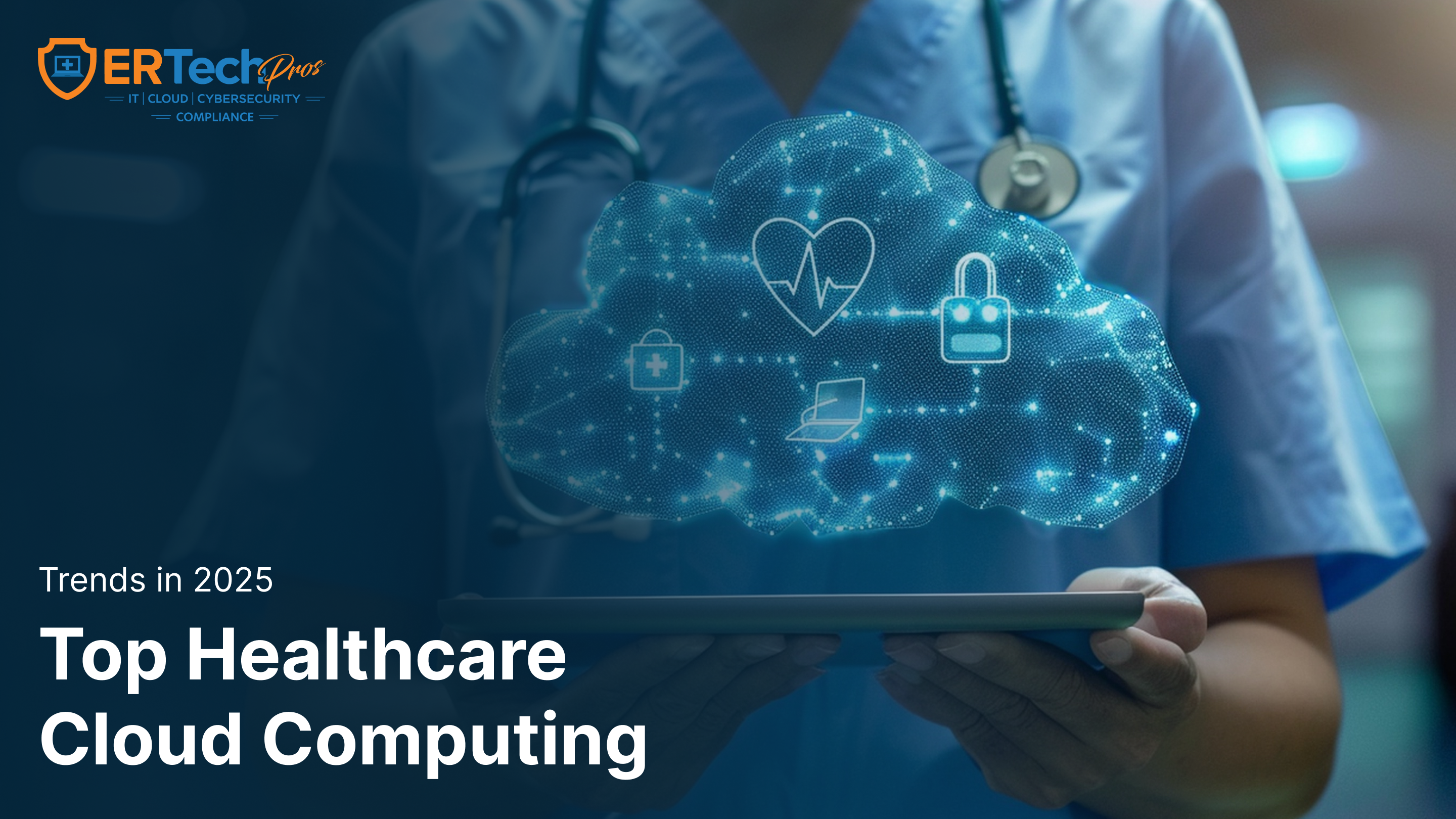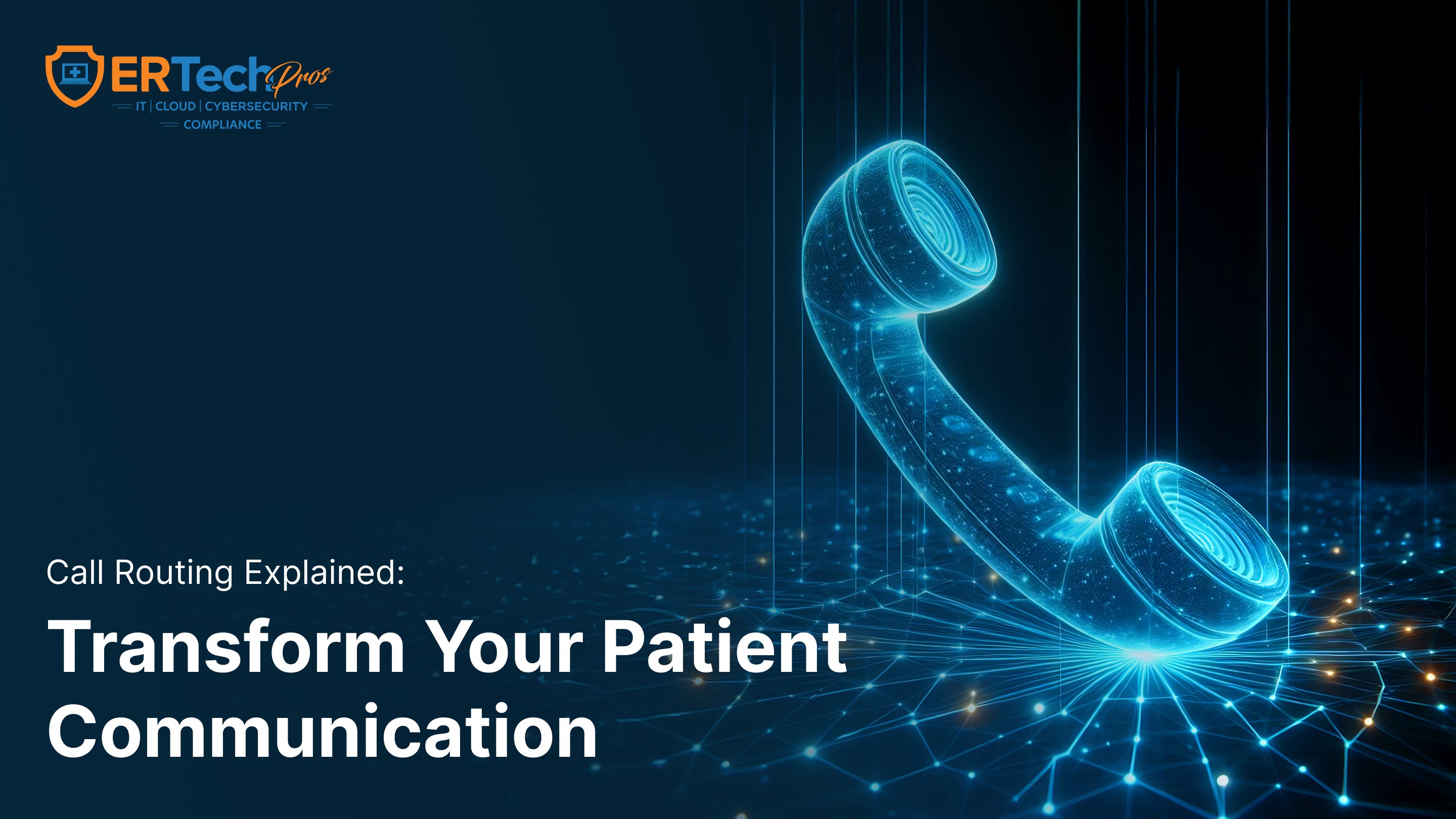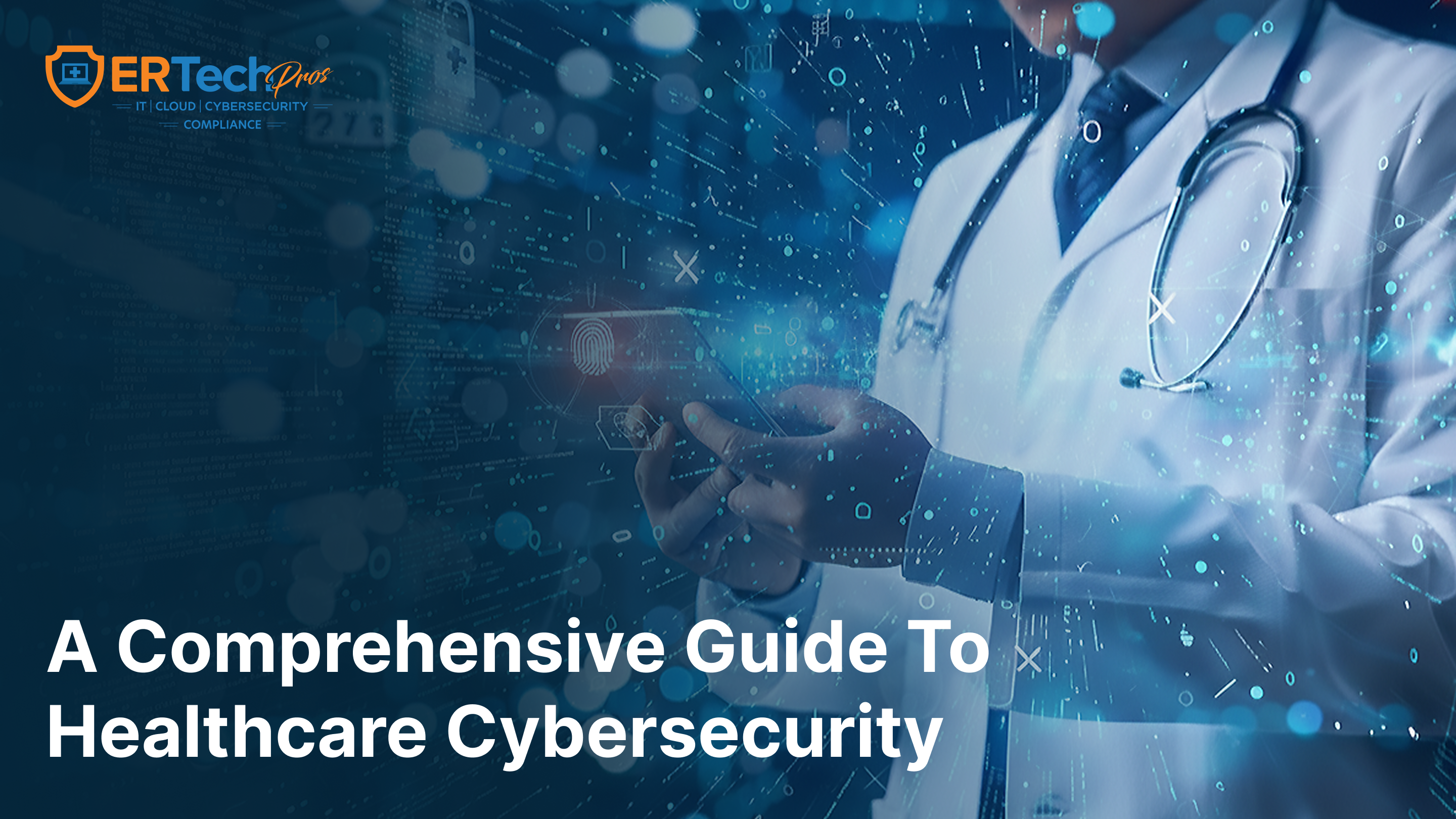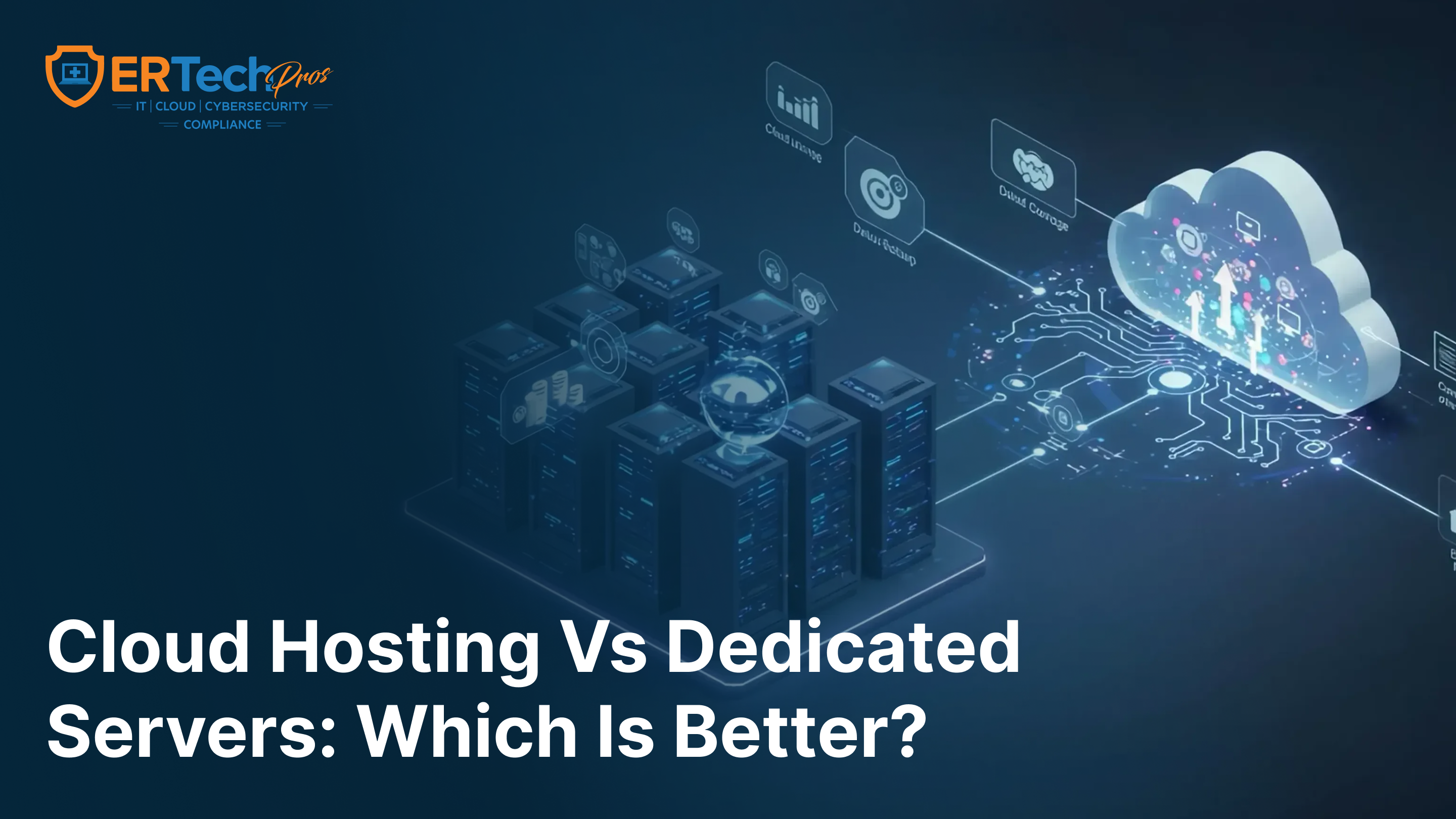Top Healthcare Cloud Computing Trends in 2025
Healthcare is rapidly moving to the cloud. Explore the key cloud computing trends transforming healthcare in 2025, from cybersecurity to scalable, compliant IT systems.

The future of healthcare and its data is in the cloud. Healthcare has been evolving at an exponential rate, and cloud technologies are becoming the backbone of modern data management, analytics, and security operations. Hospitals and clinics handle more data than ever, and cloud solutions offer the speed, security, and scalability needed to keep up.
In 2025, emerging trends will further push the industry, enhancing scalability, interoperability, and cybersecurity. At ER Tech Pros, we help healthcare organizations like yours master these changes with proven healthcare cloud computing solutions guaranteed to keep your data secure and improve efficiency.
1. Managed Cloud Services for Scalable Healthcare IT
More healthcare organizations are turning to managed cloud services to handle the growing complexity of their IT environments. With the right partner, you can scale operations securely, stay compliant, and improve patient care without overburdening internal teams.
Less Maintenance, More Focus on Care
When you have seasoned cloud experts managing your network:
- Your healthcare IT teams are free from constant server updates and troubleshooting.
- Upgrades, patches, and backups happen automatically, ensuring business continuity.
- Systems stay available and resilient even during high-demand periods.
Built-In Security and Compliance
A managed cloud provider can help healthcare organizations:
- Configure secure environments that meet HIPAA and HITECH requirements.
- Implement role-based access controls and encryptions to safeguard patient data.
- Prepare for audits with proper documentation and monitoring in place.
Scalable Infrastructure for Growth
With a managed cloud model, providers can:
- Add storage, computing power, or new applications on demand.
- Adapt to growth, new services, or patient load changes without re-architecting systems.
- Rest assured that their performance remains reliable as their needs evolve.
2. Hybrid and Multi-Cloud Strategies for Better Performance and Compliance
Relying on a single cloud provider is often not enough. That’s why more organizations are adopting hybrid and multi-cloud strategies—a mix of on-premise, private, and public cloud solutions to balance performance, security, and compliance.
- Continuous Availability: Prevent downtime by making data always accessible, even if one cloud service fails.
- More Flexibility: Choose the best cloud services for different tasks (e.g., storing patient data securely while running AI-powered analytics elsewhere).
- Cost Efficient: Optimize expenses by distributing workloads across multiple platforms and avoiding vendor lock-in.
- Smoother Compliance: Meet HIPAA and other regulations by storing sensitive data in secure, compliant cloud environments.
With hybrid and multi-cloud setups, healthcare IT becomes more resilient and adaptable to any potential risks or difficulties. Managing different cloud environments, however, can be difficult if you don’t have the right managed IT services partner.
3. Cloud-Driven Cybersecurity and Zero Trust Architecture
When confidential patient/healthcare information is in the cloud, cybersecurity becomes the biggest priority. Unfortunately, cybercriminals know this, too, as healthcare remains one of the top targets for ransomware and data breaches.
- A patient’s medical records have immense value in the black market (it’s worth more than a person’s credit card).
- Telemedicine and cloud computing systems grow continuously, and so do vulnerabilities in their infrastructure.
Zero Trust frameworks have been developed to control unauthorized access and protect patient information. This architecture reinforces cloud security in healthcare by:
- Assuming no user or system is trusted by default.
- Requiring continuous verification for every access attempt.
- Implementing multi-factor authentication.
- Granting users access to what they need (nothing more).
- Monitoring and logging all system interactions.
Having cloud-enhanced security also helps fortify your defenses with advanced protection mechanisms, including:
- Advanced identity and access management (IAM)
- End-to-end encryption
- Real-time threat detection and response
- Automated security patch management
- Comprehensive endpoint protection
4. Cloud Infrastructure Modernization for Peak Practice Performance
It’s no secret that legacy IT systems can no longer keep up with the speed and demands of today’s healthcare infrastructure. That’s why many are upgrading to flexible, cloud-native solutions that enable faster data processing, seamless integrations, and better responsiveness across the board.
Faster Performance When It Matters
A modernized cloud infrastructure helps you:
- Support real-time applications like EHR access, telehealth, and remote patient monitoring.
- Reduce system lag and downtime that can delay clinical decisions.
- Maintain consistent performance during peak hours or emergencies.
Built for Growth and Innovation
Up-to-date cloud architecture allows your practice to:
- Quickly scale computing power and storage as patient volume or data needs grow.
- Deploy new digital health tools without overhauling existing systems.
- Stay agile when adopting innovations like AI or IoT in care delivery.
Improved Reliability and Support
With the right cloud setup and partner, your practice can:
- Automate backups, monitoring, and disaster recovery protocols.
- Reduce the burden of maintaining outdated hardware.
- Receive expert guidance and support when issues arise.
5. Cloud-enabled IT Integration for a Unified Healthcare Ecosystem
Healthcare IT environments are often a tangled mix of old systems, new platforms, and scattered data. But now, cloud computing offers the perfect solution to bring it all together.
Real-Time System Connectivity
Cloud-based platforms allow different healthcare systems to communicate instantly, so your data from telehealth, in-person visits, and diagnostic tools always stay in sync.
Improved Clinical Workflows
By integrating applications and automating data sharing, care teams can reduce manual data entry, avoid duplication, and spend more time with patients.
Faster and More Reliable Data Exchange
Using secure APIs and standards like FHIR, cloud computing allows different systems to exchange data easily and in real time.
Better Data Visibility Across the Organization
With centralized access to up-to-date information, providers can make informed decisions and respond to patient needs faster.
Easier Compliance and Data Governance
Integrated cloud environments simplify security and privacy management by consolidating controls and making sure all systems follow the same standards.
Having cloud-based integrations means delivering truly coordinated care across systems to different providers. And with ER Tech Pros, you have a partner who knows how to make it all work smoothly and securely.
Let ER Tech Pros Helps Future-Proof Your Healthcare with Cloud Innovation
With cloud computing, you can create more responsive, intelligent healthcare systems to dramatically enhance patient care and streamline operations. The potential is obvious, but navigating this transformation seems impossible without the help of pros who understand both technology and healthcare.
When it’s pro solutions you require, let the experts at ER Tech help. We specialize in helping organizations harness the power of cloud computing in healthcare with security, efficiency, and compliance in mind. We take the time to understand your unique challenges so we can deliver solutions that maintain the highest standards of patient care and data security.
We’re ready to guide you through your cloud computing journey. We’ll handle your cloud computing needs so you can keep your focus where it belongs: delivering exceptional patient care.
Contact ER Tech Pros today and turn your cloud computing potential into a powerful advantage.
Got Questions? We've Got Answers
Find clear answers to common questions that help guide your healthcare IT operations.
Healthcare IT Solutions Built for Every Critical Second

Call Routing in Healthcare: Why It Matters and How to Do It Right?

What Healthcare Organizations Need to Know About Cybersecurity Services
